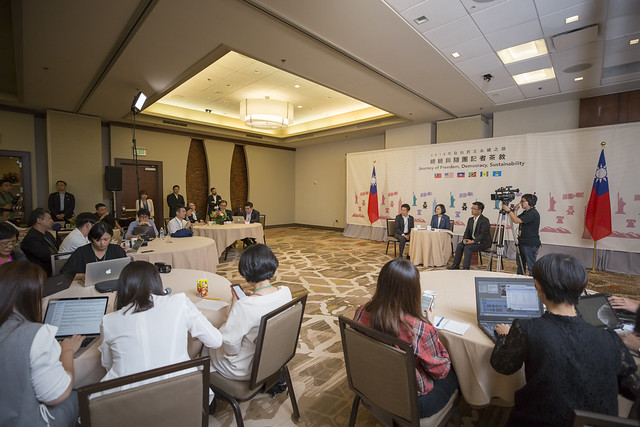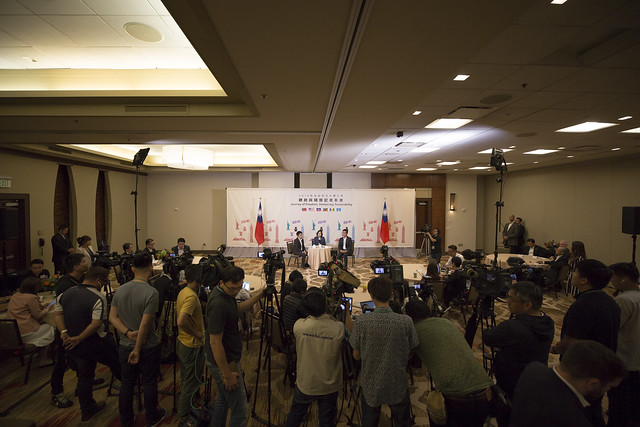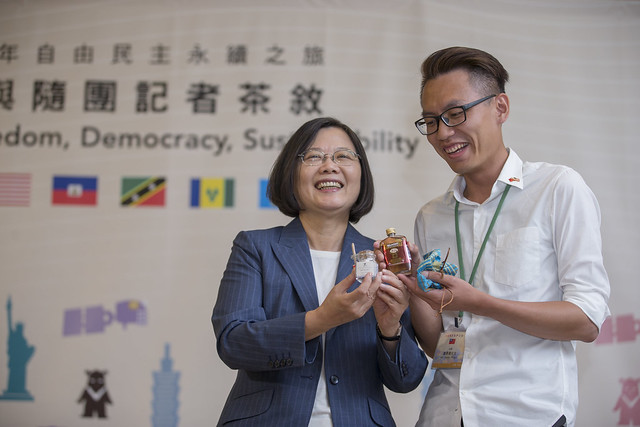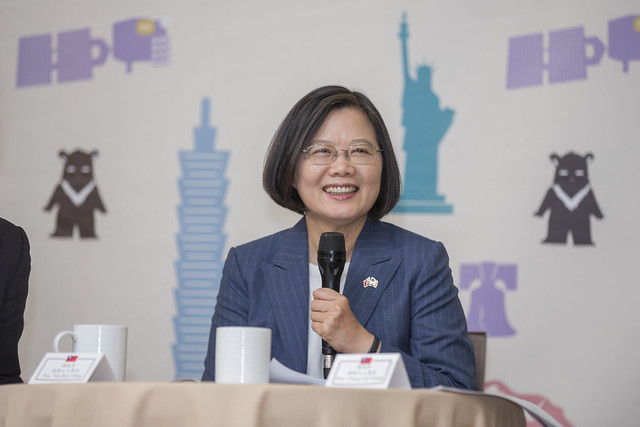News & activities
 News releases
News releases
President Tsai Ing-wen hosted a reception for the press corps accompanying the Journey of Freedom, Democracy, and Sustainability delegation on the afternoon of July 20 local time (morning of July 21 Taipei time). At the reception, she responded to media questions about the transit stop arrangements for the journey, what impressed her most about her visits to our allies, cross-strait policy, and Taiwan-US relations.
Asked about hosting a media reception in the US for the first time compared to previous practices, President Tsai said that first, she wanted to thank the US for their help with the transit stops for this trip. Administrative and legislative agencies in the US all provided extensive assistance, which made the transit stops go smoothly.
She also specially thanked American Institute in Taiwan (AIT) Chairman James Moriarty, who was also on hand, for his assistance on both transit stops, and for accompanying her throughout those stopovers. The transit stop arrangements this time, she said, provided more flexibility and time so that we could have more in-depth and substantive communication, and more opportunities to interact and exchange ideas with different organizations and agencies, and people at different levels.
Another media member asked two questions: If the president wins a second term, would there be any adjustments to the “steadfast diplomacy” that she has promoted since taking office, and what made the deepest impression on her during her trip? President Tsai responded that this was the longest trip of her presidency, visiting four allies plus two US transit stops. This, she said, was putting "steadfast diplomacy" into practice. She was happy to see that, by putting that policy into practice for several years, our relationships with our allies are getting stronger over time. During this visit to the Caribbean countries, she said, there were also opportunities to interact with the grassroots population, and actually see how we are helping them in their daily lives.
As an example, she cited the banana industry in Saint Lucia, which overcame disease because of Taiwan's help. That revived the banana industry and provided many job opportunities, impacting the lives of ten or twenty thousand people. And that's a significant achievement, she said. Our interactions with our allies bring practical improvements to people's lives. It's also a very down-to-earth way to make people really feel the impact of our diplomatic efforts and cooperative projects in their everyday lives. President Tsai also said that since the travelling press corps has seen that process at work, they would agree.
A media member then cited a report in The New York Times that said Taiwan's 2020 presidential election is a choice between governments leaning toward Beijing or Washington. President Tsai said that Taiwan is ultimately a democratic society, and she believes that domestic voters are focused on the nation’s future, especially whether Taiwan's free and democratic lifestyle will continue. She therefore thinks that the 2020 election campaign is a choice between values, political systems, and lifestyles.
President Tsai also addressed whether closer Taiwan-US relations will have an impact on cross-strait relations, saying that what Taiwanese care about is democracy, freedom, human rights, and the right to choose our own future, deciding our own future through democratic means. These are the values that Taiwanese treasure the most, and our most important considerations. So when we handle cross-strait relations, she said, we hope to preserve cross-strait peace and stability. We also hope that China can understand what Taiwanese hope for, what we value, and what we want to express through each election.
Regarding legal amendments aimed at Chinese Communist Party agents, the media also asked about possible adjustments by the Presidential Office and cabinet high-level officials. President Tsai responded that she's now engaged in diplomatic work, so there really aren't any such so-called Presidential Office or cabinet high-level discussions. She hopes that the bill suggested by the legislature can be widely discussed, and when the time comes, the executive and legislative branches will sit down and discuss them. Our guiding principles are clear: Taiwan is a democratic society, and the people have freedom of expression. But we must have appropriate measures to guarantee Taiwan's national security.
The media then asked about her visit to the US National Center for Atmospheric Research (NCAR) that morning, and her thoughts about preventing catastrophic disasters in the future. The president stated that natural disasters resulting from climate change are, indeed, a major challenge for many governments. In terms of meteorological observation and prediction, or preventing and controlling damage from natural disasters, and especially in typhoon research, we continue to enhance our capabilities. So the two important research organizations she visited that morning are both closely cooperating with Taiwan, and we have outstanding Taiwanese scientists serving in both institutions, and even leading the research.
Actually, the president said, that includes some government colleagues working at the Central Weather Bureau, with our researchers and students also participating. Especially for the Formosat-7 satellite, there is a lot of cooperation. In this area, there has been a lot of good cooperation between Taiwan and the US. We hope to deepen that cooperation, and upgrade our ability to observe and monitor natural disasters, and even effectively prepare for and mitigate disasters. These are all important tasks, she said, and we will continue to enhance our capabilities, and continue to cooperate with the US.
A reporter commented that Taiwan-US relations are now at a high point in terms of both diplomatic ties and arms sales, but also noted that US President Donald Trump, in addition to seeking re-election, must also deal with the US-China trade war. Some scholars have said that President Trump could compromise with or even yield to China prior to the US presidential election. Is Taiwan taking steps, the reporter asked, to prepare for such a scenario? President Tsai responded that Taiwan cannot comment on internal US politics, but she emphasized that Taiwan enjoys bipartisan support in the United States, in both the executive and legislative branches, and among the general public, as well. So support for Taiwan comes from across the board, and there is a nationwide consensus. Also, with respect to national security, economic and trade ties, and many economic development issues, Taiwan needs to have its own strategies, its own approach, and its own line of thinking. We will certainly act with Taiwan's own best interests in mind, she said, and will also continue to cooperate with the United States in many different areas to maintain a positive relationship.
A reporter then brought up the subject of replacement of individual combat equipment and a possible increase in combat allowances in Taiwan's armed forces, wrangling over these issues between the ruling and opposition camps, and China's diplomatic offensive and military coercion. The reporter asked how President Tsai intends to solve such problems and pursue her own agenda. The president replied that Taiwan's citizens are all in favor of having a strong military to defend Taiwan. The Hsing An project and the replacement of individual combat equipment are just individual pieces in a larger puzzle. The most important thing is to strengthen our self-defense capabilities across the board, whether it be national defense self-sufficiency, local production of naval vessels, local production of fighter jets, or various other measures to enhance Taiwan's R&D and manufacturing capabilities. In all these areas, we will use arms purchases to upgrade our combat capabilities. Noting with gratitude that the armed forces shoulder the responsibility of defending the nation, the president said she must therefore see to their needs, as well, so that those in the military service can enjoy stable lives. And when they are called on to defend the nation, they will have the best equipment and weapons systems so they can defend the nation more effectively.
Another reporter pointed out that when Prague Mayor Zdeněk Hřib visited Taipei earlier this year, he voiced a pro-Taiwan position. The reporter then asked if an international anti-China consensus had formed, and whether such a consensus would present Taiwan with opportunities. President Tsai stated in response that she believed the Prague mayor's words did not necessarily mean he is anti-China. Rather, he was simply saying that his country is assessing economic and trade interests and how to interact with China. In point of fact, she said, Taiwan is also facing the same issue. Over the past few years, Taiwan has sought to restructure and diversify its economy, and pursue economic ties with a more diverse range of countries. The president said she believes that Mayor Hřib's remarks don't actually make a big difference to what we have been doing.
A reporter then asked about discussions with US authorities on the subject of Hong Kong while the president was transiting in New York and Denver. When President Tsai mentioned the subject, the reporter asked, did Taiwan and the US appear to have a shared consensus and what is that consensus? President Tsai said she believes that Taiwan and the US think alike on Hong Kong, both supporting the demands of the Hong Kong people for freedom and democracy. She also expressed her belief that all democratic nations share this same position. We exchanged views on these matters, she said, and we all felt we should actively support the demands of the Hong Kong people for democracy and freedom. But there was no discussion about how to take further concrete action on other fronts, although there could be in the future. However, what we discussed this time was our support for democracy and freedom in Hong Kong, she said, and our hope that everyone can join together to give Hong Kong more support.
A member of the media then asked for President Tsai's comments on a number of firsts that had occurred during this trip. President Tsai, for example, made her first presidential stopover in New York, and the presence of AIT Chairman Moriarty at the current press event marked the first time that an AIT chairman had ever attended a press reception by a Taiwan president during a US stopover. The president responded that the transit stop arrangements this time provided more flexibility and time so that the delegation had better exchanges with a wide range of counterparts, and discussions on various issues did much to spur the development of bilateral relations.
President Tsai further stated that during her visits to Taiwan's diplomatic allies in the Caribbean, it made a particularly deep impression on her when she personally inspected the aid programs carried out there by Taiwan, and she saw how these programs have improved the lives of ordinary people. The banana cultivation projects that she had mentioned a bit earlier, for example, have helped ensure better banana crops, which are a key source of income for farmers. The visits to all four of the Caribbean nations made her very aware that Taiwan's ties with these countries are not limited to the government level, because interactions with ordinary citizens there also demonstrate to our diplomatic allies that Taiwan is truly a good friend. We often say that "Taiwan can help," and from their own experience, ordinary people can see that is true.
Among those present were National Security Council Secretary-General David T. Lee (李大維), Minister of Foreign Affairs Joseph Wu (吳釗燮), and ROC Representative to the United States Stanley Kao (高碩泰).












